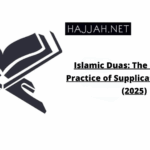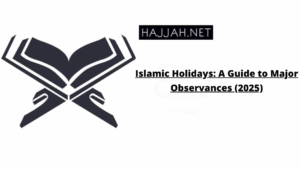Anxiety, worry, and stress are natural parts of the human experience, touching lives regardless of background or belief. In Islam, while practical steps and seeking professional help when needed are encouraged, turning to Allah (God) through Du’a (supplication) and remembrance is a fundamental source of comfort, strength, and relief. The Quran and the Sunnah (teachings and practices of Prophet Muhammad, peace be upon him) offer powerful supplications specifically aimed at alleviating distress and finding inner peace. This article explores some of these recommended Du’as for anxiety relief.
Disclaimer: Du’a is a vital spiritual tool for seeking Allah’s help and finding comfort. However, if you are experiencing severe, persistent, or debilitating anxiety or related mental health conditions, it is also important and encouraged within Islam to seek help from qualified healthcare professionals (doctors, therapists).
The Power of Du’a and Remembrance (Dhikr) in Islam
Du’a is the act of calling upon Allah, asking for His guidance, help, forgiveness, and blessings. It is a direct conversation with the Creator, an expression of humility, and a demonstration of reliance (Tawakkul) on Him. Engaging in Du’a acknowledges that ultimate control and relief lie with Allah.
Also Read
Complementary to Du’a is Dhikr, the remembrance of Allah. This involves reciting specific phrases (like SubhanAllah, Alhamdulillah, Allahu Akbar, La ilaha illallah), reciting the Quran, or reflecting on Allah’s names and attributes. The Quran itself highlights the calming effect of this practice:
“…Verily, in the remembrance of Allah do hearts find rest.” (Quran 13:28 – Ar-Ra’d)
Both Du’a and Dhikr are powerful spiritual practices for managing anxiety and finding tranquility.
Specific Du’as for Anxiety, Stress, and Distress
Here are some specific supplications taught in the Quran and Sunnah known for seeking relief from worry and anxiety:
1. Dua of Prophet Yunus (Jonah) (AS)
Recited by Prophet Yunus (peace be upon him) when he was in the belly of the whale, this Du’a is renowned for relieving distress. The Prophet Muhammad (PBUH) said that no Muslim supplicates with this Du’a for anything except that Allah will respond to him.
- Arabic: لَّآ إِلَٰهَ إِلَّآ أَنتَ سُبْحَٰنَكَ إِنِّى كُنتُ مِنَ ٱلظَّٰلِمِينَ
- Transliteration: La ilaha illa anta subhanaka inni kuntu minaz-zalimin.
- Translation: “There is no deity except You; exalted are You. Indeed, I have been of the wrongdoers.” (Quran 21:87)
2. Dua for Distress and Relief from Worries
This comprehensive Du’a was taught by the Prophet Muhammad (PBUH) to seek refuge from various afflictions that cause anxiety and sadness.
- Arabic: اللَّهُمَّ إِنِّي أَعُوذُ بِكَ مِنَ الْهَمِّ وَالْحَزَنِ، وَالْعَجْزِ وَالْكَسَلِ، وَالْبُخْلِ وَالْجُبْنِ، وَضَلَعِ الدَّيْنِ وَغَلَبَةِ الرِّجَالِ
- Transliteration: Allahumma inni a’udhu bika minal-hammi wal-hazan, wal-‘ajzi wal-kasal, wal-bukhli wal-jubn, wa dala’id-dayni wa ghalabatir-rijal.
- Translation: “O Allah, I seek refuge in You from worry (hamm) and grief (hazan), from inability (‘ajz) and laziness (kasal), from miserliness (bukhl) and cowardice (jubn), from being heavily in debt (dala’id-dayn) and from being overpowered by men (ghalabatir-rijal).” (Sahih al-Bukhari)
3. Dua for Ease in Difficulty
When facing overwhelming situations that cause anxiety, this Du’a asks Allah to make things easy.
- Arabic: اللَّهُمَّ لَا سَهْلَ إِلَّا مَا جَعَلْتَهُ سَهْلًا، وَأَنْتَ تَجْعَلُ الْحَزْنَ إِذَا شِئْتَ سَهْلًا
- Transliteration: Allahumma la sahla illa ma ja’altahu sahlan, wa ‘anta taj-alul hazna idha shi’ta sahlan.
- Translation: “O Allah, there is no ease except in that which You make easy, and You make the difficult, if You wish, easy.” (Sahih Ibn Hibban)
4. Seeking Forgiveness (Istighfar)
Constantly seeking Allah’s forgiveness is a means of purification and removing burdens, which can alleviate anxiety.
- Simple Form: Saying “Astaghfirullah” (I seek forgiveness from Allah).
- Prophetic Dua: Allahumma anta Rabbi la ilaha illa anta, Khalaqtani wa ana abduka, wa ana ‘ala ahdika wa wa’dika mastata’tu, A’udhu bika min Sharri ma sana’tu, abu’u Laka bini’matika ‘alaiya, wa abu’u laka bidhanbi faghfir lee fa innahu la yaghfiru adhdhunuba illa anta. (O Allah, You are my Lord, none has the right to be worshipped except You. You created me and I am Your servant, and I abide by Your covenant and promise as best I can. I seek refuge in You from the evil of what I have committed. I acknowledge Your favour upon me and I acknowledge my sin, so forgive me, for verily none can forgive sins except You.) (Sahih al-Bukhari)
5. Sending Salawat upon the Prophet (PBUH)
Sending blessings upon the Prophet Muhammad (PBUH) is an act of love and obedience that brings immense blessings, including relief from worries.
- Common Form: “Allahumma salli ‘ala Muhammad wa ‘ala ali Muhammad” (O Allah, send your prayers upon Muhammad and the family of Muhammad).
- Context: A companion asked the Prophet (PBUH) how much of his supplication time he should dedicate to sending Salawat. The Prophet indicated that dedicating significant time to it would suffice his worries and lead to forgiveness (Tirmidhi – Hasan).
Quranic Verses for Calmness
The entire Quran is a source of guidance and healing, but certain verses are particularly known for bringing peace and protection:
- Ayat al-Kursi (The Verse of the Throne – Quran 2:255): Considered one of the greatest verses in the Quran, reciting it offers protection from Shaytan (Satan) and brings immense peace and reassurance of Allah’s power and knowledge.
- Surah Ar-Ra’d (13:28): As mentioned earlier, “Verily, in the remembrance of Allah do hearts find rest.” A direct reminder of where true tranquility lies.
- General Quran Recitation: Simply reciting or listening attentively to any part of the Quran can have a profoundly calming effect on the heart and mind.
Complementary Islamic Practices
Du’a is most powerful when combined with other acts of faith and practice:
- Regular Prayer (Salah): The five daily prayers are the primary connection with Allah, offering structure, discipline, and moments of peace throughout the day.
- Trust in Allah (Tawakkul): Cultivating deep reliance on Allah and acceptance of His decree, knowing He is in control, can significantly reduce anxiety about the future.
- Patience (Sabr): Enduring difficulties with steadfastness and faith.
- Healthy Lifestyle: Islam emphasizes caring for one’s physical body through adequate sleep, balanced nutrition, and physical activity, all of which positively impact mental well-being.
Important Note on Professional Help
While Du’a and other spiritual practices are powerful tools for managing anxiety and finding peace, Islam also encourages seeking appropriate means for treating ailments. If anxiety is severe, persistent, interferes with daily life, or manifests as a diagnosed anxiety disorder, seeking help from qualified medical professionals (doctors, therapists, psychiatrists) is essential and encouraged. This does not contradict faith or reliance on Allah; rather, it is utilizing the means He has provided for healing.
Conclusion
For Muslims facing anxiety, stress, or worry, turning to Allah through sincere Du’a (supplication), Dhikr (remembrance), and engagement with the Quran offers profound comfort, strength, and relief. Specific supplications taught by Prophet Muhammad (PBUH) and verses from the Quran provide powerful spiritual tools to navigate challenging emotions and seek tranquility. By combining these spiritual practices with trust in Allah (Tawakkul), patience (Sabr), and seeking professional help when necessary, individuals can find holistic support in managing anxiety and fostering inner peace.









